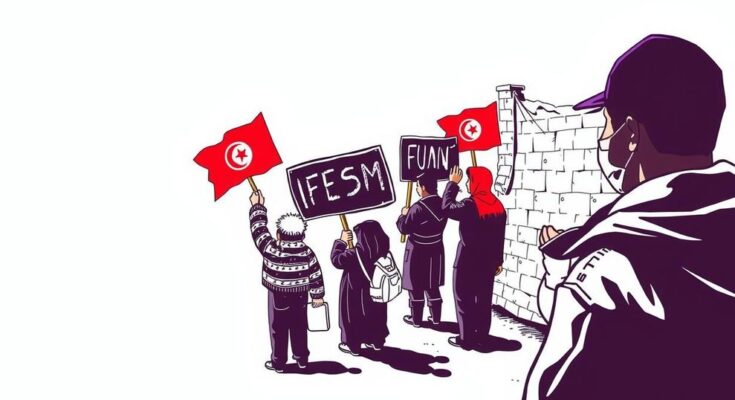Tunisia’s treatment of migrants has come under scrutiny due to shocking human rights violations reported by the UN. A significant number have died attempting to cross the Mediterranean or during interceptions at sea. Under President Kais Saied, the government’s increasingly authoritarian approach has led to brutal consequences for migrants, with violence reported against those seeking refuge. The EU’s support for Tunisia has raised concerns regarding complicity in these human rights abuses, highlighting a need for independent investigations into the situation.
Tunisia has come under fire for harsh treatment of migrants, raising significant human rights issues. A recent UN report highlighted alarming practices, reportedly involving violence during interceptions at sea. These include beatings, threats of firearms, and incidents leading to deadly capsizes. Many have died while attempting to cross the Mediterranean, with 189 fatalities from January to July, and 265 additional deaths attributed to interceptions. Reports of serious violence against sub-Saharan migrants are particularly troubling. Migrants who make it to Tunisian shores face brutal treatment, including being taken to remote desert areas and shot at when attempting to return home. The UN rapporteurs condemned the excessive force used during these operations, prompting outcry from human rights advocates, who have documented these abuses. Many report consistent obstruction of humanitarian efforts as the Tunisian government clamps down on migrant rights. The harsh stance on migrants has escalated under President Kais Saied, who has increasingly ruled with an iron fist since 2019. Accusations of authoritarianism are rampant, especially following his reelection earlier this month. Activists point to Saied’s disrespectful comments about migrants as potential factors intensifying the crisis. Migrants shared chilling experiences of violent encounters with Tunisian authorities, fearing retribution if identified. The European Union has called for an investigation into the treatment of migrants in Tunisia, but officials have largely ignored these pleas. A 2023 migration agreement provides financial support for Tunisian border protection yet has been criticized for exacerbating the suffering of migrants. Local activists argue that international aid facilitates a crackdown on migration and violates human rights. Organizations like Amnesty International have condemned EU cooperation with Tunisia, likening it to past complicity in Libya’s oppressive refugee policies. Despite all documented abuses, support from the EU to Saied’s government continues. Simultaneously, Tunisia has begun deporting migrants post-return, raising alarm among human rights advocates. In late September, the EU hinted at establishing an independent monitoring mission in Tunisia to investigate these abuses, but its acceptance by the Tunisian government remains uncertain.
The ongoing crisis in Tunisia regarding migrants sheds light on a dire humanitarian situation. Tunisia, often seen as a safe harbor, has been narrated in stark contrast as UN experts unveil disturbing realities faced by migrants. Faced with violence at sea and inadequate support, the tales emerging from detention centers illustrate the vulnerability of those seeking refuge. As international entities weigh in on Tunisia’s treatment of migrants, the collaboration between the EU and Tunis demonstrates the complexities of balancing migration control and human rights.
The situation for migrants in Tunisia is dire, showcasing systemic abuse and a troubling disregard for human rights, especially under the current regime. As the EU continues to support Tunisia, serious ethical concerns are raised, underscoring the need for thorough investigations into the treatment of migrants. The international community’s continued complicity, coupled with a lack of accountability for violations, threatens to further entrench this humanitarian crisis. Pressures on Tunisia’s government and potential international interventions remain uncertain.
Original Source: www.dw.com



